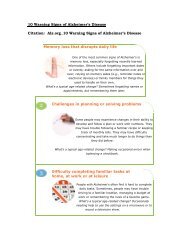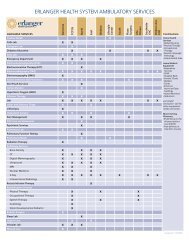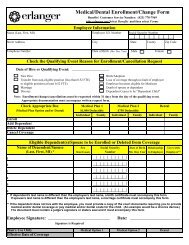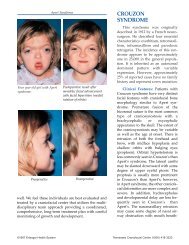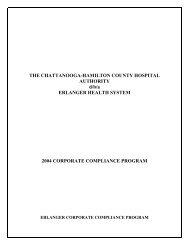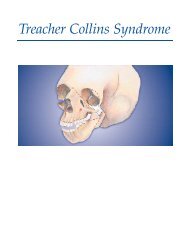2011 Cancer Committee Members - Erlanger Health System
2011 Cancer Committee Members - Erlanger Health System
2011 Cancer Committee Members - Erlanger Health System
You also want an ePaper? Increase the reach of your titles
YUMPU automatically turns print PDFs into web optimized ePapers that Google loves.
Prostate <strong>Cancer</strong><br />
Prostate cancer is the most frequently diagnosed cancer in men, and for reasons that remain unclear, incidence<br />
rates are significantly higher in blacks than in whites. In 2010, 59 men were newly diagnosed and<br />
treated for prostate cancer at the <strong>Erlanger</strong> <strong>Health</strong> <strong>System</strong>. This was 7% of the total 887 analytic cases reported<br />
in 2010.<br />
Per the American <strong>Cancer</strong> Society, it is estimated that there will be 240,890 men newly<br />
diagnosed with prostate cancer in <strong>2011</strong> with an estimated 33,720 deaths from prostate<br />
cancer in <strong>2011</strong>, making prostate cancer the second-leading cause of cancer death in men.<br />
The risks factors and symptoms are as follows:<br />
Research has shown that men with certain risk factors are more likely than others to develop prostate<br />
cancer. A risk factor is something that may increase the chance of getting a disease. Studies have found the<br />
following risk factors for prostate cancer.<br />
Age: Age is the main risk factor for prostate cancer and the chance of a male getting prostate cancer increases<br />
as he gets older. In the United States, about 63% of all prostate cancer cases are diagnosed in men<br />
aged 65 and older. This disease is rare in men under 45.<br />
Family history: A man’s risk is higher if his father, brother or son has been diagnosed with prostate cancer.<br />
Recent genetic studies suggest that strong familial predisposition may be responsible for 5-10% of prostate<br />
cancers.<br />
Race/ethnicity: Prostate cancer is more common among black men than white or Hispanic/Latino men.<br />
It is less common among Asian/Pacific Islander and American Indian/Alaska Native men.<br />
Certain prostate changes: Men with cells called high grade prostatic intraepithelial neoplasia (PIN) may be<br />
at increased risk of prostate cancer. These prostate cells look abnormal under a microscope.<br />
Certain Genome changes: Researchers have found specific regions on certain chromosomes that are linked<br />
to the risk of prostate cancer. Recent studies show if a man has a genetic change in one or more of these<br />
regions, the risk of prostate cancer may be increased.<br />
22<br />
Prostate <strong>Cancer</strong><br />
Signs and Symptoms<br />
A man with early prostate cancer may not have symptoms. For those with more advanced disease, individuals<br />
may experience weak or interrupted urine flow, inability to urinate, difficulty starting or stopping the<br />
urine flow, the need to urinate frequently, blood in the urine, or pain/burning with urination. Advanced<br />
prostate cancer commonly spreads to the bones, which may cause pain in the hips, spine, ribs or other areas.<br />
Detection and Diagnosis<br />
Physicians may check for prostate cancer before a patient has symptoms. During an office visit, the physician<br />
will ask about the patient’s personal and family medical history and he will perform a physical exam. Patients<br />
may have one or both of the following tests:<br />
Digital rectal exam: the physician inserts a lubricated, gloved finger into the rectum and feels the prostate<br />
through the rectal wall. The prostate is examined for hard or lumpy areas.<br />
Prostate-specific antigen (PSA) blood test: this simple blood test allows laboratory technicians to determine<br />
PSA levels. Prostate-specific antigen (PSA) is a protein that is normally secreted and disposed of by the<br />
prostate gland. An elevated/high PSA level is commonly caused by BPH or prostatitis (inflammation of<br />
the prostate), but also may be caused by prostate cancer.





